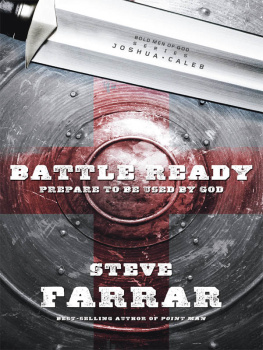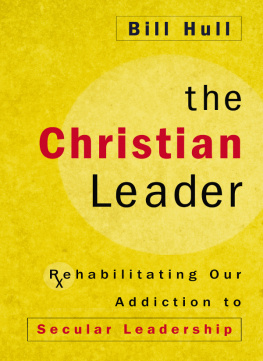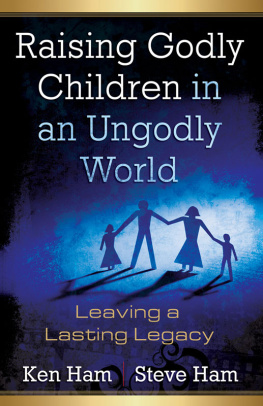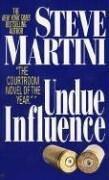For speaking and conference information, write, e-mail, or call:
Steve Farrar
Mens Leadership Ministries
4801 Legendary Drive
Frisco, Texas 75034
(800) MEN-LEAD (636-5323)
www.stevefarrar.com
POINT MAN
published by Multnomah Books
1990, 2003 by Steve Farrar
Scripture quotations are from:
The Holy Bible, New International Version
1973, 1984 by International Bible Society,
used by permission of Zondervan Publishing House
Other Scripture quotations are from:
New American Standard Bible (NASB)
1960, 1977 by the Lockman Foundation
The Living Bible (TLB)
1971. Used by permission of Tyndale House Publishers, Inc.
All rights reserved.
The New Testament in Modern English, Revised Edition (P HILLIPS)
1958, 1960, 1972 by J. B. Phillips
ALL RIGHTS RESERVED
No part of this publication may be reproduced, stored in a retrieval system, or transmitted, in any form or by any meanselectronic, mechanical, photocopying, recording, or otherwisewithout prior written permission.
Published in the United States by WaterBrook Multnomah, an imprint of The Crown Publishing Group, a division of Random House Inc., New York.
M ULTNOMAH and its mountain colophon are registered trademarks of Random House Inc.
Library of Congress Cataloging-in-Publication Data
Farrar, Steve.
Point man : how a man can lead a family / Steve Farrar.
p. cm.
eISBN: 978-0-307-56449-8
1. FathersReligious life. 2. ParentingReligious aspectsChristianity. I. Title.
BV4846.F36 1990
248.8421dc20
90-37435
v3.1_r1
To
James R. Farrar,
my dad,
in appreciation for over forty years
of spiritual leadership
where it really counts.
At home.

CONTENTS
Appendix:
The Meaning of Headship in the New Testament
ACKNOWLEDGMENTS
In 1977, I had lunch with Ray Stedman at the Elks Club in Palo Alto, California. Ray, who is now with the Lord, had been pastor of Peninsula Bible Church since 1951. I was a twenty-seven-year-old rookie pastor in my first church.
As we were talking, I mentioned my interest in writing. Ray, who had published numerous books, was very encouraging. Then he said, Steve, let me offer you some advice. Dont publish until youre forty. In that moment, I saw my entire life pass before my eyes. Thirteen years? That sounded like an eternity. Now its here. And so is the book.
A number of people played strategic roles in enabling this book to become a reality.
Dr. John Reed and Scott Ford were key players in the early stages.
Thanks to Stu Weber for recounting his own combat experiences in Vietnam for me. Stu described the experience of going on patrol in such vivid detail that I felt I had been there with him.
Many thanks to Steve Lyon for doing such a great job on the study guide. Steve spent numerous hours going over each chapter to produce a tool that has been widely used in mens groups across the country.
Charlie Boyd, Doug Daily, and the men of Grace Community Church willingly participated as I test-marketed these concepts in the spring of 1989. Their feedback and input were extremely valuable. Charlie, Don Lewis, Jay Werth, Dennis Eenigenburg, and Jeff Farrar each took the time to make astute evaluations of the manuscript.
Special thanks to the team at Multnomah. Larry Libby and Brenda Jose provided an initial chemistry that was hard to resist. John Van Diest had the vision to go for it, and Larry and Steve Halliday supplied the editorial spit and polish. Tim Kimmel told me you guys were sharp!
Rachel, John, and Joshua Farrar, three of the best kids in the United States of America, were extremely patient and understanding as Dad wrote The Book. They gave me valuable help and assistance all the way from page one to the very end.
My mother, Beverly Farrar, covered the domestic bases at our house for two weeks while Mary, Josh, and I were all recovering from a mutant form of mononucleosisand I was facing a deadline. Thanks for coming through in the clutch, Mom. Once again.
My wife, Mary, is the Most Valuable Player of this entire project. Come to think of it, shes the MVP of my entire life. Proverbs asks the question, An excellent wife, who can find? I did.
INTRODUCTION
A LLOW ME TO state something that is very obvious. You are reading this from left to right. What might not be obvious is that, if it were written in Hebrew, you would be reading it from right to left. Books published in English are read from front to back. Books written in Hebrew are exactly the oppositeyou read from back to front.
I bring that up for a reason.
Thomas Watson, the old Puritan sage, once said that Some providences of God, like Hebrew letters, are best understood backwards. Many times in life we find ourselves not understanding why God has permitted us to be in a hard place or in difficult circumstances. But if you wait a few years, and then read your life backwards, you can often see His good purposes.
I wrote Point Man in the last six months of 1989. On New Years Eve I went to Federal Express to overnight the manuscript so the publisher would receive it on the agreed date: January 2, 1990. On that day I had no idea how this book would alter my life and ministry. But some thirteen years and 400,000 copies later, I can look back and see the good providence of God.
Several of those providences are worth remembering and passing on to you. Actually, all of those providences are worth passing on, but time and space does not allow for it. So why dont we go to the videotape and look at the highlights?
Today, there are mens ministries everywhere you lookmens conferences, father/son conferences, and a focus on mens accountability groups in thousands of churches across America.
In 1989, specific ministries to men virtually did not exist. Generally speaking, churches had womens ministries, youth ministries, and senior adult ministries. But there was nothing for the men. Oh, here and there you might find a mens pancake breakfast or a group of men who would go on a missions trip together. But those were the exceptions. Men were the sleeping giants of the evangelical church. And they were overlooked and under-equipped. In 1989, if a church got fifty or sixty men out for a mens retreat, that was considered a big deal.
I pastored for fifteen years before Point Man was released in the summer of 1990. As a rookie pastor, it didnt take me too long to figure out that men were very strategic. It seemed to me that about 90 percent of the counseling issues that I ran into came about because a man did not undertake the spiritual leadership role that God had called him to in his family. Not knowing any better, I began to focus on the men in my small church. It seemed to me that, if we could get the men, we would soon have the wives and kids. At the same time, the larger goal wasnt just to get the menit was to equip them to be spiritual leaders of their families.
So, instead of ignoring the men I decided to focus on them. Years later, I did my doctoral dissertation on men. I asked more than one thousand men more than seventy questions about their families, faith, marriages, parenting, and careers. That research gave me a pretty good handle on the issues men were dealing with.












